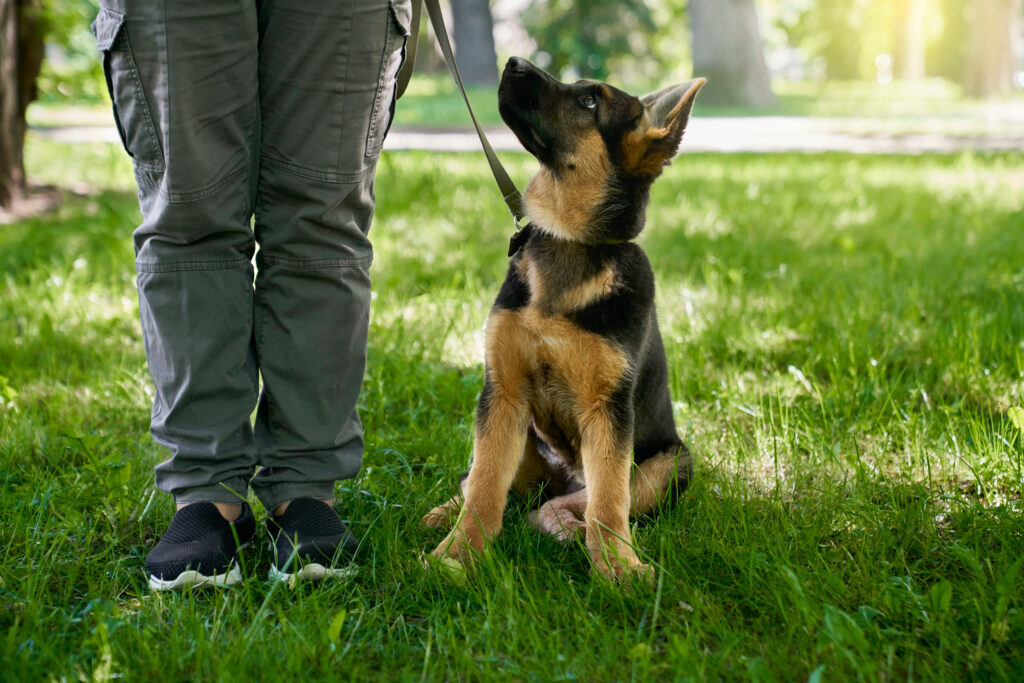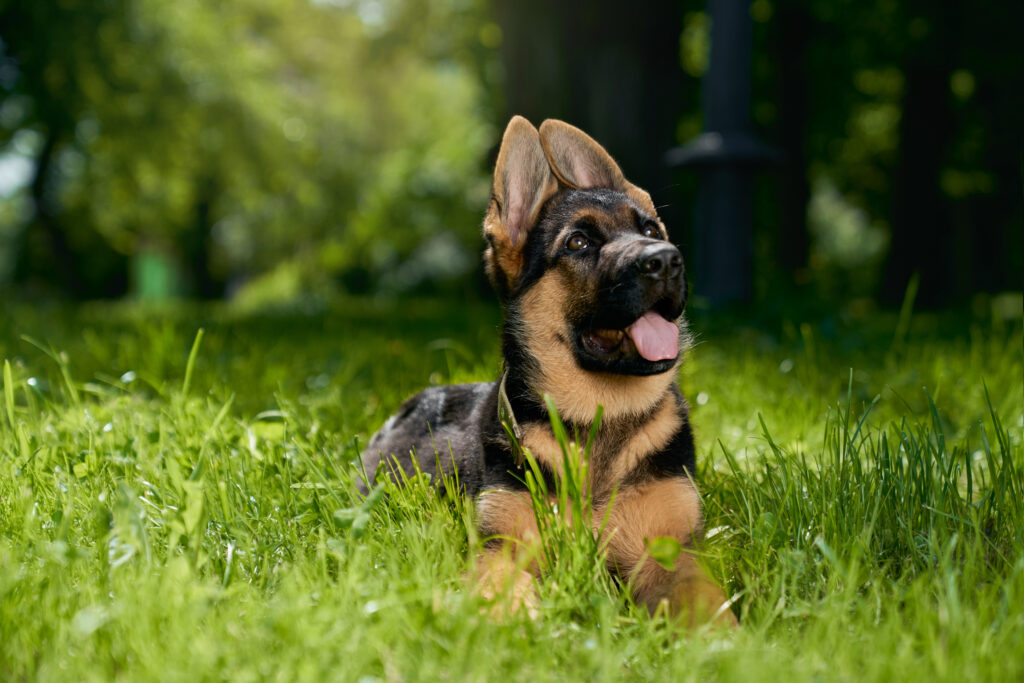Introduction :- Frequently Asked Questions About German Shepherd Dogs
German Shepherds, with their striking appearance and versatile abilities, have long been one of the most beloved dog breeds worldwide. Whether you’re a proud German Shepherd owner or considering bringing one into your life, you likely have questions. In this blog, we’ll explore 50 frequently asked questions about German Shepherds in a human-friendly tone to help you better understand these incredible companions.
Table of Contents :- Frequently Asked Questions About German Shepherd Dogs.
1. What makes German Shepherds stand out as a breed?
German Shepherds are renowned for their adaptability, intelligence, and loyalty. They excel in various roles, including as police and service dogs.
2. How big do German Shepherds get?
Adult male German Shepherds typically weigh between 65-90 pounds, while females range from 50-70 pounds.
3. Are German Shepherds good family dogs?
Yes, they can be excellent family dogs. They are protective, loyal, and often great with children when properly socialized.
4. Do German Shepherds get along with other pets?
With proper training and socialization, German Shepherds can coexist peacefully with other pets.
5. How much exercise do German Shepherds need?
German Shepherds are an active breed and require at least 60-90 minutes of exercise per day.
6. Do they shed a lot?
Yes, German Shepherds shed throughout the year, and they experience heavier shedding during seasonal changes.
7. What’s the lifespan of a German Shepherd?
German Shepherds often live between nine to thirteen years.
8. How intelligent are German Shepherds?
German Shepherds rank among the most intelligent dog breeds and are quick learners.
9. Do they require special grooming?
Regular brushing to manage shedding, along with occasional baths and nail trimming, is usually sufficient.
10. Are they good guard dogs?
Yes, German Shepherds are natural protectors and make excellent guard dogs with the right training.
11. What health issues are common in German Shepherds?
Hip dysplasia, elbow dysplasia, and degenerative myelopathy are some common health concerns.
12. How do you train a German Shepherd puppy?
Early socialization, positive reinforcement, and consistent training are key to raising a well-behaved German Shepherd.
Frequently Asked Questions About German Shepherd Dogs

Frequently Asked Questions About German Shepherd Dogs
13. Are German Shepherds good in apartments?
They can adapt to apartment living if given enough exercise and mental stimulation, but they thrive in homes with yards.
14. How much do German Shepherds eat?
Feeding requirements vary, but on average, adult German Shepherds may consume 3-4 cups of high-quality dog food per day.
15. Are they prone to separation anxiety?
Yes, German Shepherds may develop separation anxiety if left alone for extended periods. Proper training can help alleviate this.
16. Do German Shepherds bark a lot?
They can be vocal, especially if not properly trained. Early training helps manage excessive barking.
17. Can German Shepherds swim?
Yes, many German Shepherds enjoy swimming, but not all of them are natural swimmers. Introduce them to water gradually.
18. How do you introduce a German Shepherd to new people?
Early socialization is crucial. Start with positive experiences, and expose them to various people, places, and situations.
19. Are German Shepherds good with children?
Generally, they are good with children when raised with them, but supervision is essential to ensure a positive interaction.
20. When is the ideal time to begin a German Shepherd’s training?
Begin training as early as possible, ideally when they are puppies, to establish good behavior habits.
21. Do German Shepherds have sensitive stomachs?
Some may have sensitive stomachs, so it’s important to feed them a balanced diet and monitor their reactions to different foods.
50 Frequently Asked Questions About German Shepherd Dogs
22. Can German Shepherds live in hot climates?
Yes, but precautions such as providing shade, ample water, and avoiding excessive exercise during hot periods are necessary.
23. How do you groom a German Shepherd’s coat?
Regular brushing, especially during shedding seasons, and occasional baths are key to maintaining a healthy coat.
24. Are German Shepherds prone to allergies?
Like any breed, some German Shepherds may have allergies. Consult with a veterinarian if you suspect any kind of issues.
25. Do they need special dental care?
Maintaining good oral health requires regular dental care, which includes giving them dental chews and brushing their teeth.
26. Are German Shepherds prone to aggression?
Proper training and socialization are essential to prevent aggressive behavior. They are generally not aggressive when raised in a loving environment.
27. Do they need a lot of mental stimulation?
Yes, German Shepherds are highly intelligent and benefit from mental stimulation through activities like puzzle toys and training exercises.
28. How do you choose a reputable breeder?
Look for breeders with good reputations, transparent practices, and a focus on the health and well-being of the dogs.
29. Can German Shepherds be left alone?
While they can handle some alone time, it’s important not to leave them alone for extended periods to prevent boredom and anxiety.
30. Do German Shepherds like to cuddle?
Many German Shepherds enjoy cuddling with their owners, especially after a day of activity.
Frequently Asked Questions About German Shepherd Dogs

Frequently Asked Questions About German Shepherd Dogs
31. How often should you bathe a German Shepherd?
Generally, bathing every 2-3 months is sufficient unless they get exceptionally dirty.
32. Are German Shepherds prone to obesity?
With proper diet and exercise, obesity can be avoided. It is imperative that their weight be regularly monitored.
33. Do they need a lot of space to roam?
While they appreciate space to move, they can adapt to smaller living environments with sufficient exercise.
34. Are German Shepherds good at agility training?
Yes, their intelligence and athleticism make them well-suited for agility training.
35. Can they be trained for specific tasks or jobs?
Absolutely. German Shepherds excel in various roles, including police work, search and rescue, and as assistance dogs.
36. Are German Shepherds good off-leash?
With proper training, many German Shepherds can be trusted off-leash in secure environments.
37. How do you prevent destructive behavior?
Sufficient exercise, mental stimulation, and providing appropriate toys can help prevent destructive behavior.
38. Do German Shepherds have a strong prey drive?
Some may have a strong prey drive, so early training is essential, especially around smaller animals.
39. What is the best age to spay/neuter a German Shepherd?
Consult with your veterinarian, but generally, spaying/neutering is done between 6-9 months.
40. How much time should be dedicated to training each day?
Short, focused training sessions of 10-15 minutes are effective. Consistency is more important than duration.
41. Are German Shepherds prone to specific eye issues?
They can be susceptible to conditions like cataracts and progressive retinal atrophy. Regular veterinary check-ups are important.
42. What type of collar or harness is best for German Shepherds?
Choose a sturdy collar or harness that provides control without restricting their movement.
43. Are German Shepherds prone to ear infections?
Regular cleaning and checking their ears can help prevent ear infections.
44. Can German Shepherds be trained for protection?
Yes, with proper training, they can be excellent protection dogs. Professional guidance is recommended.
45. Do German Shepherds have a specific exercise routine they enjoy?
They thrive on activities like fetch, agility courses, and obedience training. Mixing up routines keeps them engaged.
Frequently Asked Questions About German Shepherd Dogs

Frequently Asked Questions About German Shepherd Dogs
46. How do you introduce a German Shepherd to a new home?
Gradual introductions to different areas of the home and meeting family members one at a time can help ease the transition.
47. Can German Shepherds live in cold climates?
Yes, their double coat provides insulation, but providing shelter from extreme cold is still essential.
48. How Should a German Shepherd Puppy Be Socialized?
Expose them to various people, environments, and situations positively. Puppy classes can also be beneficial.
49. Are German Shepherds prone to joint issues?
Yes, hip and elbow dysplasia are common concerns. Maintaining a healthy weight and proper exercise can help minimize the risk.
50. Can German Shepherds be service dogs?
Absolutely. Their intelligence and versatility make them well-suited for service roles, including guide dogs and therapy dogs.
Remember, Frequently Asked Questions About German Shepherd Dogs offer general insights, individual dogs may have unique needs and temperaments. It’s essential to consult with breeders, trainers, and veterinarians for specific guidance based on the dog’s individual characteristics.
Conclusion :- Frequently Asked Questions About German Shepherd Dogs
German Shepherds are remarkable companions with unique characteristics and needs. By understanding these Frequently Asked Questions About German Shepherd Dogs, you’ll be better equipped to provide the love, care, and training these loyal dogs deserve. Whether you’re a seasoned German Shepherd owner or considering adding one to your family, the bond you create with these incredible dogs will undoubtedly be rewarding.
Please Note that the care and maintenance of your pets and its inhabitants will depend on the specific species you choose. Always seek advice from experienced hobbyists or pet specialists to ensure the well-being of your Pets ( visit our ecommerce website thebrreed.com)
Thank you for reading our blog Frequently Asked Questions About German Shepherd Dogs.




